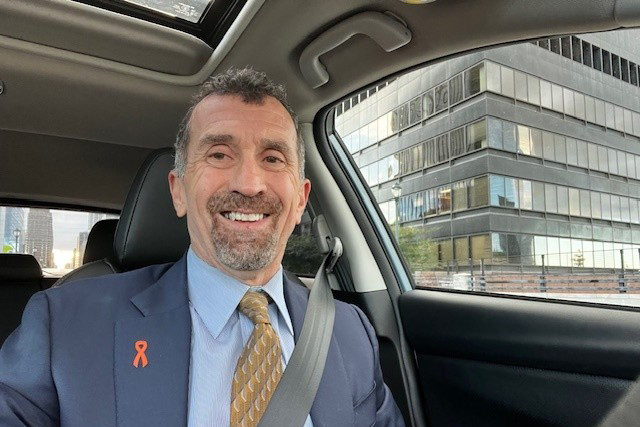
Now Enrolling: The PTCL-STAT research study is testing the use of stem cell transplants for patients with an aggressive type of lymphoma
May 19, 2025
Trial Results: ECOG-ACRIN research round-up – Summer 2025
July 24, 2025Building a lasting bond: Your oncologist as partner through good and bad times

By Glenn Sykes, Genitourinary Cancer Research Advocate
Hearing the words, “You have cancer,” can be one of the most difficult moments in a person’s life. Common reactions include fear, uncertainty, and disbelief. In addition, patients barely have time to process these emotions before they must start making decisions—about treatments, side effects, insurance, finances, and more. Thankfully, patients do not need to do this alone. They can and should rely on the support of family, friends, and other patients and survivors. Yet, one relationship stands out as increasingly important to patient satisfaction with their treatment experience and overall well-being: their relationship with their oncologist.
Thanks to advances in cancer research and treatment, over 18 million survivors are living in the United States today and that number continues to grow. Many people are now able to manage their disease while they continue to live full lives. Patient-oncologist relationships are becoming longer term and more significant than they have ever been. Over the years, a tremendous amount of goodwill gets built in these relationships. However, like with any relationship, miscommunication or conflict is possible, but a few key guiding principles and tips can keep the bond strong.
- Mutual Trust
Patients report that their trust increases when their doctors demonstrate their expertise and share current, specific knowledge about their cancer. Patients like to know that their doctors are up to date on the latest research—and they want their oncologists to come to each appointment prepared with plans and treatment options. Likewise, oncologists must be able to trust their patients to share accurate information about their symptoms, side effects, and concerns. Without these details, it is more difficult for oncologists to provide the best possible care. - Shared Decision-Making
Doctors should be open to shared decision-making, explaining the rationale for their decisions and also supporting patients in seeking second or third opinions, if desired. They should acknowledge that the relationship will likely be a long-term one and be willing to collaborate with their patients as partners. Patients should be clear about their circumstances, values, and preferences, to help inform treatment decisions. Patients shouldn’t be afraid to share their whole person with their oncologists. They should also ask questions and clarify points of confusion, so they feel confident in their next steps. Patient communities or support groups can also be useful resources to help patients feel informed and confident. - Clear Communications
Receiving bad news is an inevitable part of living with cancer. Doctors should be practiced at delivering that news and willing to do so directly. The task should not be left to assistants or online portals. During visits, doctors should be attentive and resist multitasking. They should use patient-friendly language and avoid medical jargon that might be confusing or difficult to understand. They should take the time to ensure the patient’s understanding is what they want it to be and how they can be reached after the appointment. Patients can also help ensure clear communication by compiling questions prior to appointments, taking notes or recording conversations (with permission), and asking for pauses when needed to get a clearer understanding. It can also be beneficial to bring a friend or family member along to provide support and help with notetaking. - Empathy
Empathy is a key ingredient to a positive patient-oncologist relationship. Patients want their oncologists to recognize that they are more than just their cancer: they are people with busy lives, commitments, and stressors aside from their disease. They want their doctors to keep in mind their overall well-being and acknowledge that they are likely suffering both emotionally and physically. At the same time, patients cannot expect their oncologist to be perfect: oncologists are also humans and can misspeak or have a bad day. Often, issues can be resolved with open communication and taking steps to preserve the goodwill that has grown with that relationship.
Of course, it is possible for a patient and an oncologist to simply not be a good fit. In that case, patients should not be afraid to change doctors. A positive patient-oncologist relationship is a necessary component of quality cancer care—and it is a relationship worth prioritizing.
If you are interested in this topic and would like to share your experiences or thoughts, please leave a comment below.
Use our Contact Form to send a message to the author.
Glenn Sykes is a member of the ECOG-ACRIN Cancer Research Advocates Committee and Genitourinary Cancer Committee. He has lived with kidney cancer since 2010 and is a passionate advocate for research, education, and patient support. He collaborates with organizations like KidneyCAN to raise awareness and promote clinical trial participation. Glenn is committed to helping others navigate their kidney cancer journey with knowledge and community support.


1 Comment
Well done, Glenn. Short and succinct enough that it may actually be read by the people who need to read it.